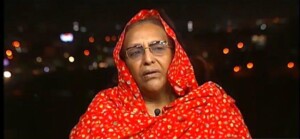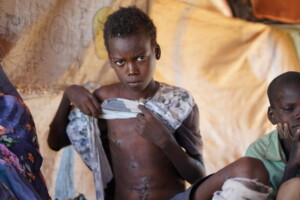‘Sudan war impacting environment and climate’

Resarcher and writer Iman Seifeldin (Photo: supplied)
The war that erupted in Sudan between the Sudanese Armed Forces (SAF) and the paramilitary Rapid Support Forces (RSF) nearly 15 months ago has impacted the environment and climate in Sudan, particularly in Darfur, according to a leading Sudanese environmental activist, who asks whether these can be considered ‘climate crimes’, to be brought before the International Criminal Court (ICC).
Iman Seifeldin, a researcher in the fields of environment, conflicts, and migration, and a board member and founder of the Sudanese Environmental Association, explains in an interview with Radio Dabanga’s Sudanese Files programme, broadcast on Friday, that the ICC only prosecutes war crimes, crimes against humanity, genocide, and crimes of aggression.
She points out that the war in Darfur, which began between rebel movements and the Sudanese regime of Omar Al Bashir in early 2003, affected the entire region. Similarly, the ongoing SAF-RSF armed conflict impacts all parts of Darfur.
“Most of the population in the Darfur region are farmers and herders, relying on the land for their livelihood. Due to the wars, the majority now live in camps after being forced to flee their homes, and the violence prevents them from returning to their lands and resuming their economic activities. The impact on the environment is significant; when agricultural lands are left uncultivated for many years, the soil is exposed to erosion, making it extremely difficult to restore its productive capacity,” she explained.
“This is a clear example of how forced displacement due to war, in the long term, affects the suitability of lands for agriculture, causes damage, and has consequences for the population’s return post-conflict.”
The environmentalist mentions the Kondowa forest southeast of Nyala, the capital of South Darfur, which disappeared entirely due to illegal logging. Displaced Darfuris, having lost their livelihoods in agriculture and herding, became dependent on producing and selling firewood. This led to the destruction of the local plant and animal environment.
She warns that the destruction of forests and the resultant climate change will manifest over time, reducing atmospheric humidity and moderate weather, alongside the complete loss of vegetation cover, which she terms as a fully-fledged environmental crime.
ICC jurisdiction
The ICC could adapt its statutes to prosecute environmental crimes, as legal texts allow for this despite the lack of precision in ICC laws defining environmental damage.
“Generally, where war crimes are committed, environmental crimes related to the living conditions of the population are likely to occur, such as depriving people of food and medicine. These are included in the Rome Statute and defined as crimes against humanity or genocide,” Seifeldin explains.
“This enables the ICC to include in its jurisdiction a set of laws related to the natural environment and the severe danger to people’s lives. For the court to begin examining environmental cases in Darfur, various legislative levels in Sudan, including federal, state, and local laws, must be considered. The specificity of Darfur, which has a regional level according to the October 2020 Juba Peace Agreement, further complicates the determination of responsibilities.”
Specialised teams
Environmental crime cases require different levels of investigation, addressing various aspects such as pollution associated with gold mining, Seifeldin says.
“The ICC needs to appoint investigators with environmental specialisations and knowledge of Sudan’s environment. They should be able to take soil, water, or air samples from affected areas to monitor and audit environmental crimes.”
Seifeldin concludes by calling on the ICC to help Sudan establish specialised courts for environmental crimes, not only in Darfur but throughout Sudan. She stresses that preserving the environment is crucial for achieving political, economic, and developmental stability, as it is the fundamental starting point for the people’s lives in Sudan.











 and then
and then